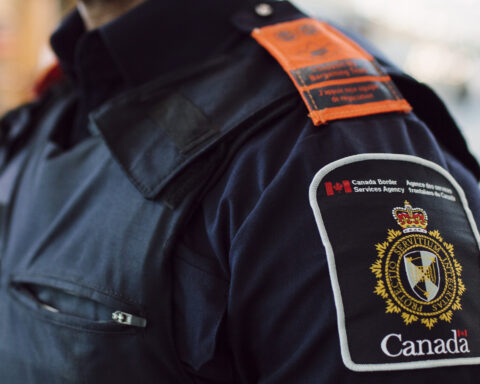“It’s very important to love your job from day one,” Egyptian Canadian journalist Mohammed Fahmy said to a packed room at the Toronto Public Library’s Bram and Bluma Appel Salon on Monday evening.
“The government wants to get you, extremists want to get you, and you have nowhere to go. As a young journalist, you should understand that journalism is a tough job. It’s one of the most dangerous jobs in the world.”
Fahmy was reflecting on his long journey to freedom after being jailed in Egypt under charges of conspiring with the now-banned Muslim Brotherhood. He had spent 400 days behind bars, including one month in solitary confinement.
After a gruelling legal battle with the help of high-profile human rights lawyer Amal Clooney and a global network of supporters, Fahmy was released on a presidential pardon.
He landed in Canada on Thanksgiving day and has been speaking to different audiences across the country about his experience.
“It was surreal, it was tough [and] there were issues that complicated the case,” he said.
Caught in Egypt’s legal system
Fahmy had been working for Al Jazeera for only three months when the democratically-elected but short-lived Morsi government was overthrown and the Muslim Brotherhood, a party affiliated with Morsi, was labeled a terrorist organization.
Overnight, the Egyptian government began cracking down on what it deemed to be terrorist activities. This resulted in the arrest of many journalists including Fahmy and his Al Jazeera colleagues Peter Greste and Baher Mohammed.
Fahmy was accused of conspiring with the Muslim Brotherhood and fabricating materials that undermined the country’s national security.
The trial lasted for four months, after which Fahmy and Greste were sentenced to seven years in prison. Their colleague Baher Mohamed received a ten-year sentence.
“The government wants to get you, extremists want to get you, and you have nowhere to go.”
According to Fahmy, the court proceedings were incredibly frustrating. In a moment of candor, Fahmy recalls the open cage in which he and his co-accused had to stand as the trial proceeded.
During the trial, he often spoke out against what he felt was wrong and took any opportunity to address the media in the courtroom.
The cage was subsequently replaced with a sound-proof box, “Thanks to my big mouth!” Fahmy said as the audience laughed.
Free speech and freedom of the press
The seasoned journalist said he was merely doing his job alongside his colleagues by reporting from the frontline on Egypt’s rapid political transitions.
“We were doing what everybody does. We were reporting from both sides,” Fahmy recalls.
As someone who has been reporting from the frontlines, including during the Iraq war, Fahmy feels it’s naïve to think that his arrest was simply about freedom of the press.
“This case has two aspects. First aspect was freedom of expression, but it also has a political aspect,” Fahmy explained.
“It was surreal, it was tough [and] there were issues that complicated the case.”
He suggested that a “vendetta” between the Egyptian and Qatari government complicated the case from the outset. Al Jazeera English, which is partly funded by the Qatar ruling family, has had difficulty operating in the country; in fact, Egypt had revoked the broadcast license for its Arabic sister channel, Al Jazeera Mubasher Broadcast.
To make matters worse, while Fahmy’s trial was underway, Al Jazeera was suing the Egyptian government for revoking the broadcast license.
As a result, he says he was caught in a game of “political ping-pong” between international news agencies and governments.
Social media activism
According to Fahmy, his arrest signalled a dangerous muzzling of the press in Egypt, but advocacy through social media channels was what helped pave the road to his freedom.
Two weeks following Fahmy and his Al Jazeera colleagues’ arrest, a global social media storm picked up in an effort to secure their release.
In February 2015, Fahmy’s wife Marwa and his brothers launched the #HarperCallEgypt social media campaign to pressure the current Prime Minister Stephen Harper to intervene.
Fahmy believes social media campaigns played an important role in drawing attention to his unfair detention in Egypt. He said it allowed for people who didn’t know him at all to realize the urgency of his case and help amplify the cause. Without it, “I think it would have been a whole different situation,” he added.
Advocacy through social media channels was what helped pave the road to his freedom.
He’s also appreciative of the Al Jazeera’s collective effort to amplify his voice through social and traditional media channels. Nevertheless, Fahmy says, he was disappointed in the network’s mishandling of his case, which resulted in his prolonged incarceration.
The newly released journalist is currently suing Al Jazeera for $100 million in damages, although, he says, “I don’t like finger pointing, I genuinely want to make things happen for other journalists.”
Moving forward
Fahmy’s experience with being imprisoned for his work has changed his perspective on journalism. “Being on this side of the camera made me realize how important this job is,” he explains.
At the moment, he’s in no hurry to return to the field.
“My passion for journalism is still there and I think I will get back to it eventually,” Fahmy says thoughtfully, “but not right away.”
Fahmy will be moving into a teaching position at the University of British Columbia and has begun work on the Fahmy Foundation for Free Press which advocates for press freedom and unfairly detained journalists worldwide.
The former Al Jazeera bureau chief says he wants to “decompress” and spend time with his wife and family.





